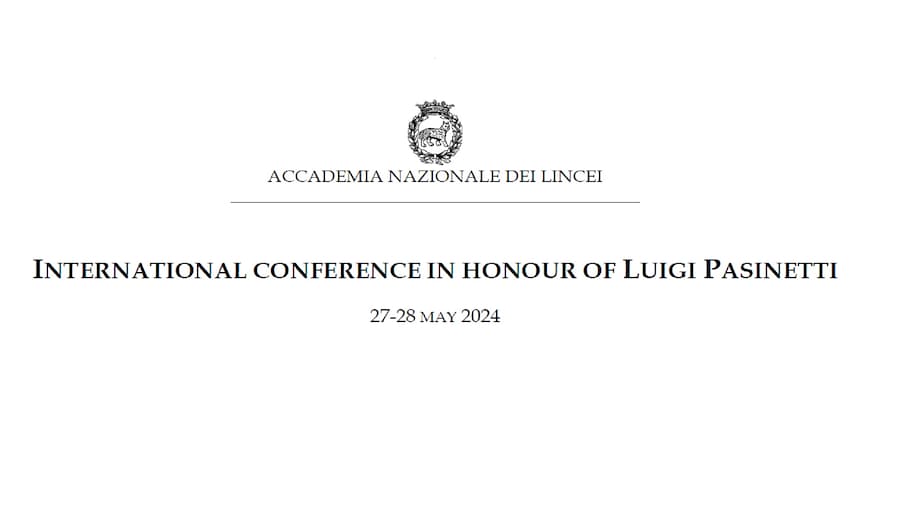International conference in honour of Luigi Pasinetti
Presso l'Accademia Nazionale dei Lincei
The aim of the Conference is to provide a comprehensive assessment of Luigi Pasinetti’s contribution to economic theory, and to explore analytical developments that build on his pathbreaking works, such as his critique of the logical foundations of neoclassical economic theory, his contribution to the post-Keynesian theory of income distribution, his theory of structural economic dynamics, and his contribution to the theory of economic policy.A distinctive feature of his contribution to economic theory is the development of a rigorous conceptual framework centred on the role of human labour, and the identification of dynamic trajectories consistent with the priority of labour as normative benchmark. Together with Piero Sraffa and Pierangelo Garegnani he has been a leading contributor to the worldwide development of the classical-Keynesian approach to economic theory. He was Honorary President of the International Economic Association (IEA), President of Società Italiana degli Economisti (SIE), first President of the European Society for the History of Economic Thought (ESHET), Fellow of the Econometric Society, and Honorary Fellow of Gonville and Caius College, Cambridge. He was a Fellow of the Accademia Nazionale dei Lincei since 1986.
Monday, 27 May
14.00 Roberto ANTONELLI (President dell’Accademia Nazionale dei Lincei): Welcome address
Session 1: Luigi Pasinetti and Political Economy at the Accademia Nazionale dei Lincei
chair: Alberto QUADRIO CURZIO (Emeritus President, Lincei)
14.20 John EATWELL (Linceo, University of Cambridge): Pasinetti versus M.I.T.: the critique of neoclassical capital theory
14.45 Annalisa ROSSELLI (Lincea, Università di Roma Tor Vergata): Luigi Pasinetti and his defence of political economy
15.10 Discussion
Session 2: The heir of the Cambridge School of Economics
chair: Alessandro RONCAGLIA (Linceo, Sapienza Università di Roma)
15.25 Maria Cristina MARCUZZO (Lincea, Sapienza Università di Roma): Pasinetti on Cambridge economics
15.50 Antonella PALUMBO (Università di Roma Tre): Rescuing the principle of effective demand: Luigi Pasinetti as an interpreter of Keynes
16.15 James GALBRAITH (Linceo, The University of Texas at Austin): Notes on a Revolution still in progress
16.40 Discussion
16.55 Coffee break
Session 3: Pasinetti’s contribution to world traditions of economic thought
chair: Roberto SCAZZIERI (Linceo, Alma Mater Studiorum Università di Bologna)
17.10 Richard ARENA (Université Côte d’Azur, Nice): On the economic behavioral and the institutional contents of Luigi Pasinetti 's structural dynamics: some reflections and suggestions
17.35 Heinz KURZ (Universität Graz): Luigi Lodovico Pasinetti's impact on research and teaching in the German speaking world
18.00 Joanilio TEIXEIRA (Universidade de Brasilia), Joao Gabriel DE ARAUJO OLIVEIRA (Universidade de Brasilia), Jorge THOMPSON ARAUJO (Universidade de Brasilia): Tax policies and the trade-off between output and the share of wages in national income from a Cantabrigian perspective
18.25 Takashi YAGI (Meji University Tokyo): Pasinetti's contribution to the Japanese tradition of economic thought
18.55 Discussion
Tuesday, 28 May
Session 4: The contributions to critical economic theory
chair: D’Maris COFFMAN (Lincea, University College London)
9.30 Mauro BARANZINI (Linceo, Università della Svizzera Italiana): Pasinetti's "New Cambridge Theorem" and the structural dynamics of socio-economic classes
9.55 Heinz KURZ (Universität Graz), Neri SALVADORI (Linceo, Università di Pisa): Luigi Lodovico Pasinetti: a major contributor to the controversies in the theory of capital
10.20 Enrico BELLINO (Università Cattolica del Sacro Cuore): Which policies from Luigi Pasinetti’s structural economic dynamic analysis
10.45 Discussion
11.00 Coffe break
Session 5: A new school of dynamic and structural political economy
chair: Alberto QUADRIO CURZIO (Linceo, Università Cattolica del Sacro Cuore)
14.00 Roberto SCAZZIERI (Linceo, Alma Mater Studiorum Università di Bologna): Dynamics and structures: Luigi Pasinetti as Classical Economist
14.25 Nadia GARBELLINI (Università di Modena e Reggio Emilia): From the years of high theory to the global financial crisis: structural dynamics and the Pasinetti archive
14.50 Ariel WIRKIERMAN (Goldsmiths, University of London): Normative prices and quantities in an expanding economy
15.15 Ivano CARDINALE (Centro Interdisciplinare Linceo Giovani; Goldsmiths, University of London): Collective objectives and structural conditions. Revisiting Pasinetti’s “institutional problem”
15.40 Discussion
15.55 Coffee break
Final Round Table: The debate between strands of economic thought
chair: James GALBRAITH (Linceo, The University of Texas at Austin)
16.10 Carlo D’ADDA (Linceo, Alma Mater Studiorum Università di Bologna): A memoir and a brief voyage through his writings 16.35 D’Maris COFFMAN (Lincea, University College London): How Luigi Pasinetti read François Quesnay and Why 17.00 Aldo MONTESANO (Linceo, Università Bocconi, Milan): Neoclassical theories and aggregation 17.25 Carlo D’IPPOLITI (Centro Interdisciplinare Linceo Giovani; Sapienza Università di Roma): Research evaluation and pluralism in economics: from Pasinetti’s warnings to today
17.50 Patrizio BIANCHI (Linceo, Università di Ferrara): Structural economic dynamics: policy making in the age of uncertainty 18.15 Alessandro RONCAGLIA (Linceo, Sapienza Università di Roma): Pasinetti: from the critique of marginalism to the reconstruction of classical economic theory
Organizing Committee: Alberto QUADRIO CURZIO (Emeritus President, Accademia Nazionale dei Lincei, Chair of the Organizing Committee), Roberto SCAZZIERI (Linceo, Co-Chair, Organizing Committee), Carlo D’ADDA (Linceo, Alma Mater Studiorum Università di Bologna), Maria Cristina MARCUZZO (Lincea, Sapienza Università di Roma), Alessandro RONCAGLIA (Linceo, Sapienza Università di Roma), Annalisa ROSSELLI (Lincea, Università di Roma Tor Vergata), Neri SALVADORI (Linceo, Università di Pisa), Enrico BELLINO (Secretary of the Lincei Organizing Committee, Università Cattolica del Sacro Cuore)
